NutrImpact: Encouraging Children
(and Adults) to Choose Healthy Foods
March 17, 2014
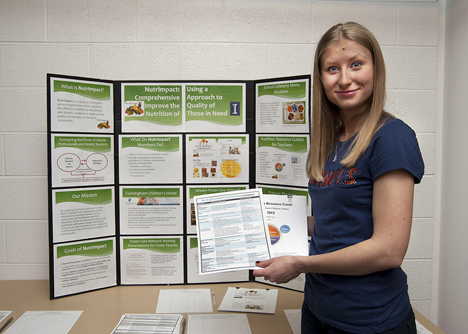
NutrImpact founder Lisa Shkoda presents NutrImpact posters and materials at ExploreACES 2013. (Photograph courtesy of NutrImpact website).
During her time at Illinois, Lisa Shkoda, who recently graduated with a Bachelor's degree in Food Science and Nutrition, decided "the community needs nutrition education." So she founded NutrImpact.
While the 60+ students and registered dieticians who comprise the organization hope to teach youngsters about nutrition and, thus, encourage them to make healthy choices when eating, they've encountered one small problem. It's not usually kids who do the grocery shopping. Thus, they've expanded their target group to include teachers and parents.
"It's not enough to just educate children," says Shkoda. "You have to have more of a comprehensive approach. Not only working with children but also with teachers. Interact with them—with parents who shop at grocery stores. They are all important."
So while the organization specifically targets children up to age 21, the organization's main goal is "making sure that people know as much as possible about nutrition and how to eat healthy while staying within their budget."
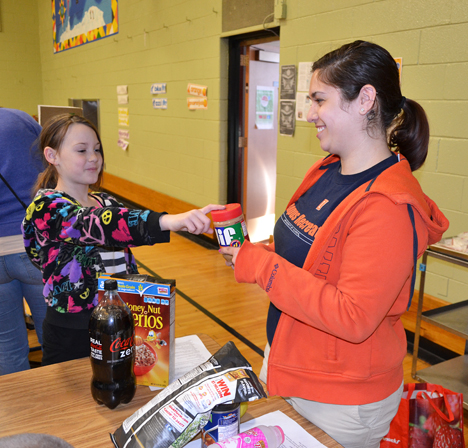
Leila Shinn (right) and a student play a game about nutrition at a NutrImpact after-school outreach at Prairie Elementary.
Since low cost meals are an emphasis, are low-income students and their families one of their target groups? Shkoda says yes.
"It happens to be that often low-income relations don't have enough nutrition education or know where to get it. Maybe they don't have access to health insurance or health care or have access to a registered dietitian or don't know where to find this free information. So, yes, we are trying to target low income."
But she acknowledges that "high-income" folks need it as well, so their goal is to "educate the community in general."
Shkoda says they specifically "try to target groups that need help the most—specifically those groups who do not have access to registered dietitian services or any other kind of nutrition services."
For instance, one group NutrImpact has worked closely with is the Cunningham Children's Home, which Shkoda contacted directly early on, because it exemplifies the type of population NutrImpact is targeting. The Home's administration was delighted to hear that the organization wanted to partner with them, and its students would provide free services.
"We help provide them with nutrition information," says Shkoda, "making sure that foster parents and staff and children and adolescents know what's healthy, and what's not, and know how to put together healthy meals without spending extra money."
So far, NutrImpact has helped the institution calculate nutritional values for their cafeteria's menu items to see whether or not they meet the national school lunch and breakfast program guidelines. In addition, NutrImpact has done several presentations there, including a cooking class, where members demonstrated to students how to make a nutritious meal (soup, a chicken stir fry, and brownies), while giving out recipes with nutritional information. "Some of them never cook," admitted Shkoda, "so we are trying to get the interest going." How did it go? "Kids loved it," says Shkoda.
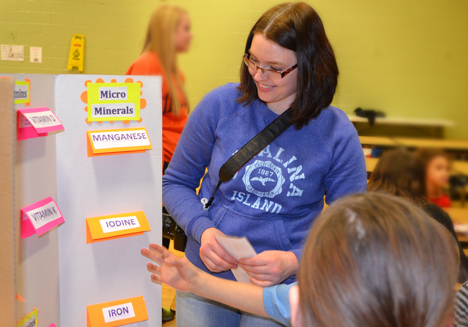
Katie Brown does a hands-on activity with youngsters at Prairie Elementary during a recent after-school activity.
Katie Brown, a senior in dietetics and current president of NutriImpact, agrees that the cooking class was a big hit at Cunningham.
"They really like our cooking class. Those kids live there, and they don't have parents to teach them how to cook, and they are moving out into the real world, and they don't know what to do. So we would help them cook. At first they would be like, 'Oh, I hate to cook!' But when we started teaching them, they loved cooking. It's just that they were never taught how to cook, so they didn't like it, because they were frustrated. But they wanted us to come back and do a BBQ with them. I know it was a really good experience."
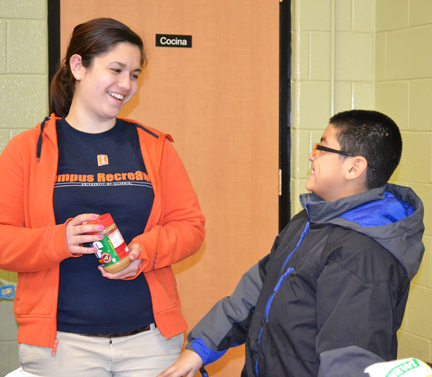
Leila Shinn and a Prairie Elementary School student enjoy a game about nutrition.
NutrImpact has also developed several nutritional guides and a number of hands-on activities about nutrition, which they've done at Urbana's Prairie Elementary School as part of their collaboration with the Illini Mentor Program.
Leila Shinn, a junior in Dietetics, who just became a NutrImpact project manager, described her experience at Prairie School:
"They're really excited, especially for the stickers and bingo. They get excited when they know exactly what you're talking about when you ask questions, and they know the food group; so they get excited when they know the answer."
Shinn believes their activities about nutrition will have a positive impact on the youngsters, not just now, but down the road: "It gives them an early exposure to healthy eating and that will help them make healthier choices later in life and live healthier lifestyles."
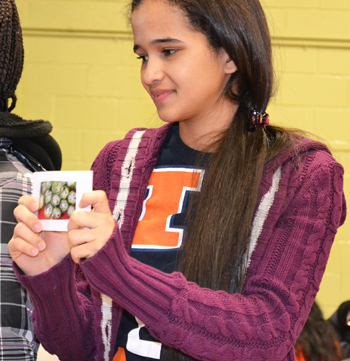
Walkyria Paula plays nutrition bingo with students during a NutrImpact after-school outreach event at Prairie Elementary.
Another NutrImpact member, Walkyria Paula, an exchange student from Brazil for the spring 2014 semester, agreed that their activities had a positive impact on the Prairie students: "In bingo, they learned a lot of the names of the foods and the vegetables that they didn't know."
While educating the community about nutrition is the main goal of NutrImpact, Shkoda also believes members of the NutrImpact team benefit as well. So her design involves Illinois students and registered dietitians working side by side to educate the community—which she believes is a win-win for both groups.
"I felt like it would be useful because students could get useful experience," says Shkoda, "and it can prepare them better for their career and make them more effective in their future career."
Brown agrees that for Illinois students, the organization's outreach activities give them a chance to put into practice what they've learned, as well as make a difference in our community.
"We do this because it's a really great experience for us, and we get to apply the stuff that we learn in the classroom, but it's also really great because we get to help the kids, and it really just makes it more rewarding."
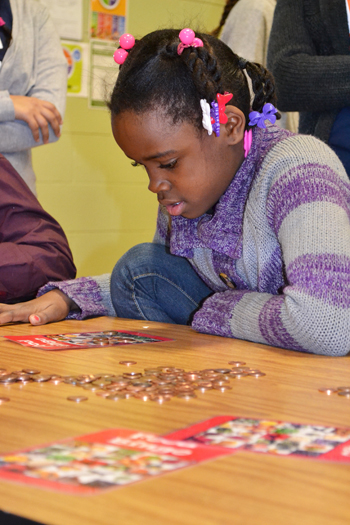
A youngster at Prairie Elementary learns about nutrition while playing bingo.
Shkoda believes her organization also provides registered dieticians "an opportunity to kind of give back and mentor students." The dieticians also have an additional role involving quality control: they "make sure students provide the most correct and the most useful information possible."
Besides being trained in nutrition, Shkoda is Ukranian, which gives her a global perspective on nutrition. Since this reporter believes Americans have extremely unhealthy eating habits, resulting in obesity, the interview with Shkoda provided a perfect opportunity to get her opinion. Does she see Americans as more unhealthy compared to the population of other nations?
Surprisingly, she doesn't. "Every country has their own nutritional problems. They might not be the same, but they might be similar in some aspects. So every country has a problem with obesity, at least in some percentage and then with underweight as well or malnourished. So those problems are there for every country…So, of course, there are differences, but I wouldn't say that Americans eat unhealthier."
What does she recommend Americans do to improve their diet?
"I would recommend getting fruits and vegetables… it's something that we need to increase and, of course, vegetables more, because they are lower calories."
Story and photos by Elizabeth Innes, Communications Specialist, I-STEM Education Initiative
More: Food Science and Nutrition, K-12 Outreach, 2014
For more information about NutrImpact, visit the organization's website.
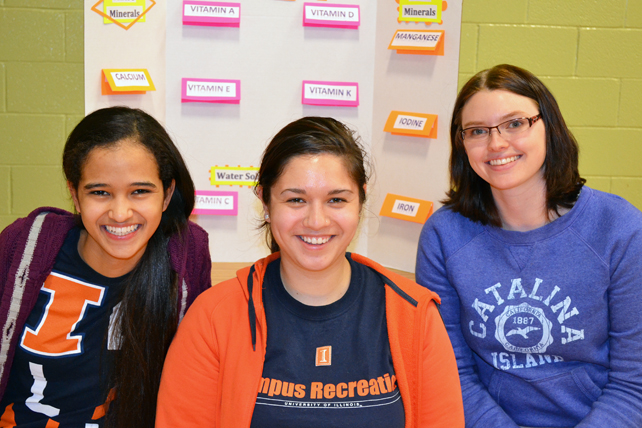
Walkyria Paula, Leila Shinn, and Katie Brown during a recent NutrImpact outreach at Prairie Elementary School in Urbana.













.jpg)
















